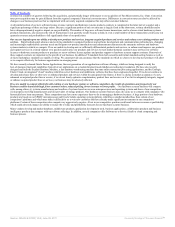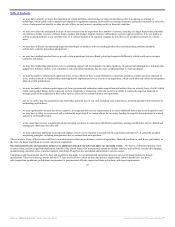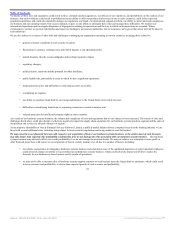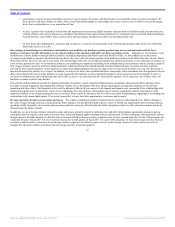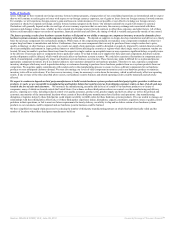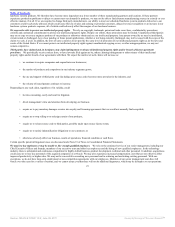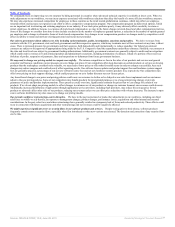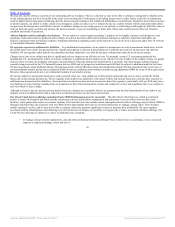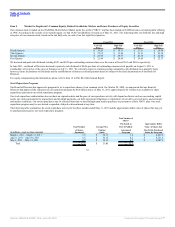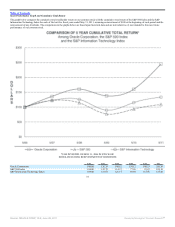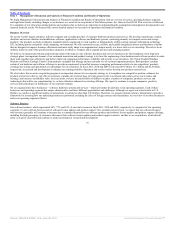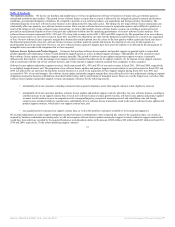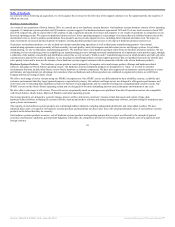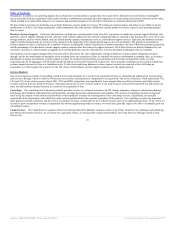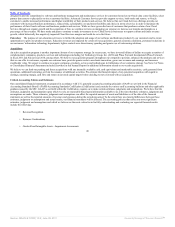Oracle 2010 Annual Report Download - page 35
Download and view the complete annual report
Please find page 35 of the 2010 Oracle annual report below. You can navigate through the pages in the report by either clicking on the pages listed below, or by using the keyword search tool below to find specific information within the annual report.
Table of Contents
Oracle’s brand and future business prospects in the event of system failures, inadequate disaster recovery or loss or misappropriation of customer
confidential information;
• we may face regulatory exposure in certain areas such as data privacy, data security and export compliance;
• the laws and regulations applicable to hosted service providers are unsettled, particularly in the areas of privacy and security and use of global
resources; changes in these laws could affect our ability to provide services from or to some locations and could increase both the costs and risks
associated with providing the services;
• demand for these services may not meet our expectations and may be affected by customer and media concerns about security risks, international
transfers of data, government or other third party access to data, and/or use of outsourced services providers more generally; and
• our offerings may require large fixed costs for data centers, computers, network infrastructure, security and otherwise, and we may not be able to
generate sufficient revenues to offset these costs and generate acceptable operating margins from these offerings.
Charges to earnings resulting from acquisitions may adversely affect our operating results. Under business combination accounting standards pursuant to
ASC 805, Business Combinations, we recognize the identifiable assets acquired, the liabilities assumed, and any non-controlling interests in acquired companies
generally at their acquisition date fair values and, in each case, separately from goodwill. Goodwill as of the acquisition date is measured as the excess amount of
consideration transferred, which is also generally measured at fair value, and the net of the acquisition date amounts of the identifiable assets acquired and the
liabilities assumed. Our estimates of fair value are based upon assumptions believed to be reasonable but which are inherently uncertain. After we complete an
acquisition, the following factors could result in material charges and adversely affect our operating results and may adversely affect our cash flows:
• costs incurred to combine the operations of companies we acquire, such as transitional employee expenses and employee retention, redeployment or
relocation expenses;
• impairment of goodwill or intangible assets;
• amortization of intangible assets acquired;
• a reduction in the useful lives of intangible assets acquired;
• identification of or changes to assumed contingent liabilities, both income tax and non-income tax related, after our final determination of the
amounts for these contingencies or the conclusion of the measurement period (generally up to one year from the acquisition date), whichever comes
first;
• charges to our operating results to eliminate certain duplicative pre-merger activities, to restructure our operations or to reduce our cost structure;
• charges to our operating results resulting from expenses incurred to effect the acquisition; and
• charges to our operating results due to the expensing of certain stock awards assumed in an acquisition.
Substantially all of these costs will be accounted for as expenses that will decrease our net income and earnings per share for the periods in which those costs are
incurred. Charges to our operating results in any given period could differ substantially from other periods based on the timing and size of our future acquisitions
and the extent of integration activities. A more detailed discussion of our accounting for these and other items is presented in the “Critical Accounting Policies
and Estimates” section of Management’s Discussion and Analysis of Financial Condition and Results of Operations (Item 7).
Environmental laws and regulations subject us to a number of risks and could result in significant liabilities and costs. Some of our hardware systems
operations are subject to state, federal and international laws governing protection of the environment, proper handling and disposal of materials used to
manufacture our products, human health and safety, and regulating the use of certain chemical substances. We endeavor to comply
31
Source: ORACLE CORP, 10-K, June 28, 2011 Powered by Morningstar® Document Research℠


